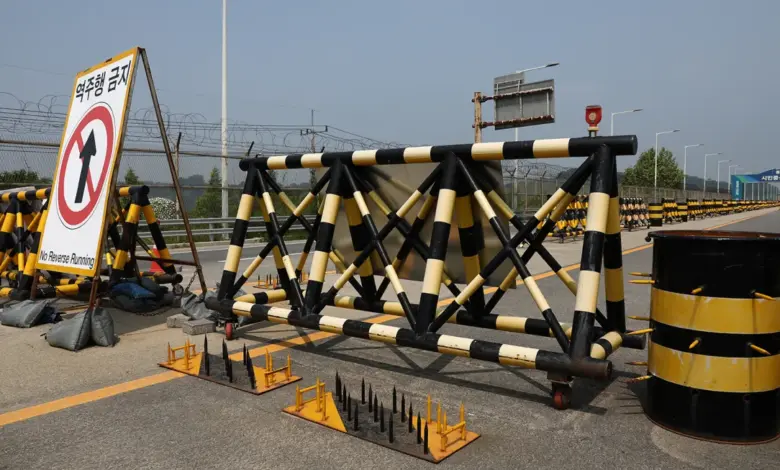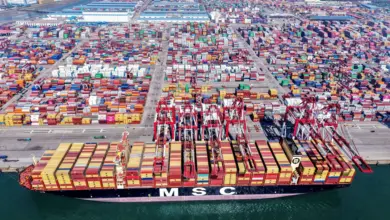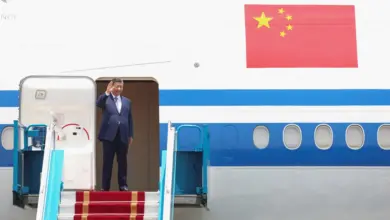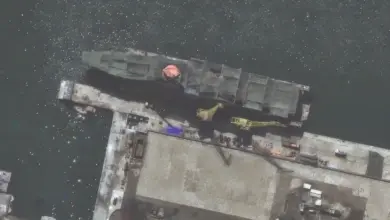
North Korea’s army said it will take the “substantial military step” of completely cutting off its territory from South Korea on Wednesday, after months of fortifying its heavily armed border.
The announcement, which comes after North Korean leader Kim Jong Un scrapped a longstanding policy of seeking peaceful reunification with South Korea earlier this year, declared that remaining roads and railways connected to the South would be completely cut, blocking access along the border.
“The acute military situation prevailing on the Korean peninsula requires the armed forces of the DPRK to take a more resolute and stronger measure in order to more creditably defend the national security,” the General Staff of the Korean People’s Army (KPA) said, according to a notice on state-run news agency KCNA that referred to North Korea by the initials of its official name, the Democratic People’s Republic of Korea.
Since January, Pyongyang has fortified its border defenses, laying land mines, building anti-tank traps and removing railway infrastructure, according to the South Korean military.
Kim has also ramped up his fiery rhetoric against the South, referring to it as the North’s “primary foe and invariable principal enemy,” a description echoed in the latest KPA notice.
The General Staff said the measures were a response to recent “war exercises” held in South Korea and visits by what it claims are US strategic nuclear assets in the region. Over the past year, a US aircraft carrier, amphibious assault ships, long-range bombers and submarines have visited South Korea, drawing angry rebukes from Pyongyang.
In a response Wednesday, South Korea’s Joint Chiefs of Staff said North Korea’s announcement was “a desperate measure stemming from the insecurity of the failed Kim Jong Un regime” and would “only lead to [its] harsher isolation.”
Hong Min, a senior research fellow at the Korea Institute for National Unification in Seoul, said North Korea’s latest move formalizes work already being done along its militarized border and suggests Pyongyang may aim to constitutionalize it in the future.
“If North Korea were to establish a new territorial clause through a constitutional amendment and sever its relationship with the South, the internal and external repercussions would be so great,” Hong told CNN, suggesting Pyongyang is taking small steps in that direction.
Simmering tensions
Inter-Korean hostilities have simmered this year as North Korea appears to have intensified its nuclear production efforts and strengthened ties with Russia, deepening widespread concern in the West over the isolated nation’s direction.
Last week, Kim threatened to use nuclear weapons to destroy South Korea if attacked, after South Korea’s president warned that if the North used nuclear weapons it would “face the end of its regime.”
Kim’s comments appeared to come in direct response to South Korean President Yoon Suk Yeol, who showcased Seoul’s most powerful ballistic missile and other weapons designed to deter North Korean threats during a parade for Armed Forces Day on October 1.
Leif-Eric Easley, a professor at Ewha Womans University in Seoul, said the Korean army’s announcement could be Pyongyang’s attempt to “shift blame for its economic failures and legitimize its costly buildup of missiles and nuclear weapons” by exaggerating external threats.
“Kim Jong Un wants domestic and international audiences to believe he is acting out of military strength, but he may actually be motivated by political weakness,” Easley said. “North Korea’s threats, both real and rhetorical, reflect the regime survival strategy of a hereditary dictatorship.”
North and South Korea have been separated since the Korean War ended in 1953 with an armistice agreement. The two sides are still technically at war, but both governments had long sought the goal of one day reunifying.
In January, Kim said North Korea would no longer seek reconciliation and reunification with South Korea, calling inter-Korean relations “a relationship between two hostile countries and two belligerents at war,” KCNA reported at the time.
In its statement, the North Korean army said it notified US forces on Wednesday morning to “prevent any misjudgment and accidental conflict” over its “fortification project.”
The United Nations Command – a multinational military force tasked with securing the heavily fortified DMZ between the two Koreas – confirmed it had been contacted by the North Korean army but said it would not discuss the specific content of messages “out of consideration for the integrity of the hotline.”




